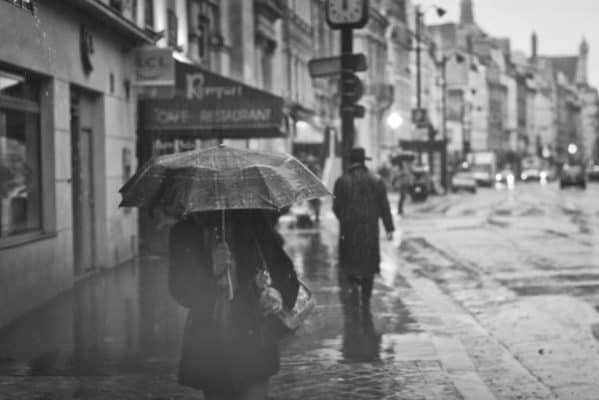5. RAIN

I like rain.
Actually, it would be more true to say I love rain. But then again, I am not prone to too much melancholy, except the seasonal, almost pleasant kind. So truth to tell, leaden skies, wind-blown sheets of rain, splashing cars, puddled pavements – for me, these only soothe.
I have discovered while immersing myself in a book of Debussy’s letters that unlike me, Debussy was prone to melancholy…or worse. Here he is writing to Ernest Chausson on a Sunday afternoon in July, 1893:
I really must settle down and write to you – not that I don’t want to, but I’m hopelessly depressed and it seems not the quiet moment to burden you with my feelings… I try and work like a navvy, but can’t manage to overcome this black melancholy which makes me dissatisfied with everything I write. I daresay it’s only a black patch I just have to get through, but what makes it worse is that it means fighting against myself, and that’s a battle I don’t always win.
Indeed, Debussy’s letters are peppered throughout with musical projects taken up then cast aside, never to be developed, much less finished. Intriguing, exciting, curious projects. One can’t help but sigh at the loss.
At times I’m so completely laid low that when the time comes to write I say to myself: “what’s the point?” There’s nothing anyone can do to rescue me. I must just quietly stay in my corner and put up with the misery that most people find incomprehensible.
Debussy wrote this early on. It was from Rome in November of 1885, when he was 23. Though he complained bitterly that he could produce little of value while in Rome, in fact, he had begun a group of songs: “Ariettes oubliées,” (Forgotten songs). These would number among his most performed, most beloved – most remembered.
Here, as he complains in his letters even about the weather in Rome, Debussy takes up the verse of Paul Verlaine and begins his work on quite a remarkable song; Il pleure dans mon cœur, Comme il pleut sur la ville (It is weeping in my heart, like it rains in the city). For this composer who once said “You learn orchestration far better by listening to the sound of leaves rustling in the wind than by consulting handbooks,” the task seemed to have been to compose the menacing spatter of rain on rooftops, while simultaneously giving voice to the soul that bears a weary, despairing heart.
* * *
I have always found something so indescribably arresting about this particular song. See if it is not the same for you. Here are two versions: Frederica von Stade with Martin Katz at the piano to start, in a beautiful modern performance, followed by Mary Garden with Debussy himself accompanying her in 1904. Try as I might, I could find no modern recording that races through the song at Debussy’s anxious and disquieting tempo.
It weeps in my heart
like it rains in the city:
What is this languor
That penetrates my heart?
O sweet falling rain,
over earth and over roofs!
For a heart in weary pain,
O song of the rain!
It rains without cause
in this numb, cold heart.
What — no treason or loss?
This grief is without cause.
It is truly the worst pain
when, without knowing why,
without love and without hate,
my heart has so much pain.
– Paul Verlaine
